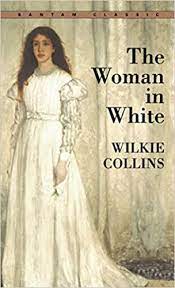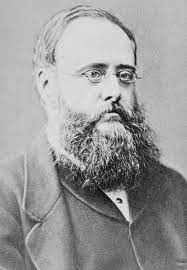The Woman in White Page #13
The Woman in White is Wilkie Collins's fifth published novel, written in 1859. It is a mystery novel and falls under the genre of "sensation novels". The story is an early example of detective fiction with protagonist Walter Hartright employing many of the sleuthing techniques of later private detectives
take pains with her. Yes. Is there anything else? No. We quite understand each other--don't we? I have no right to detain you any longer from your delightful pursuit--have I? So pleasant to have settled everything--such a sensible relief to have done business. Do you mind ringing for Louis to carry the portfolio to your own room?" "I will carry it there myself, Mr. Fairlie, if you will allow me." "Will you really? Are you strong enough? How nice to be so strong! Are you sure you won't drop it? So glad to possess you at Limmeridge, Mr. Hartright. I am such a sufferer that I hardly dare hope to enjoy much of your society. Would you mind taking great pains not to let the doors bang, and not to drop the portfolio? Thank you. Gently with the curtains, please--the slightest noise from them goes through me like a knife. Yes. GOOD morning!" When the sea-green curtains were closed, and when the two baize doors were shut behind me, I stopped for a moment in the little circular hall beyond, and drew a long, luxurious breath of relief. It was like coming to the surface of the water after deep diving, to find myself once more on the outside of Mr. Fairlie's room. As soon as I was comfortably established for the morning in my pretty little studio, the first resolution at which I arrived was to turn my steps no more in the direction of the apartments occupied by the master of the house, except in the very improbable event of his honouring me with a special invitation to pay him another visit. Having settled this satisfactory plan of future conduct in reference to Mr. Fairlie, I soon recovered the serenity of temper of which my employer's haughty familiarity and impudent politeness had, for the moment, deprived me. The remaining hours of the morning passed away pleasantly enough, in looking over the drawings, arranging them in sets, trimming their ragged edges, and accomplishing the other necessary preparations in anticipation of the business of mounting them. I ought, perhaps, to have made more progress than this; but, as the luncheon-time drew near, I grew restless and unsettled, and felt unable to fix my attention on work, even though that work was only of the humble manual kind. At two o'clock I descended again to the breakfast-room, a little anxiously. Expectations of some interest were connected with my approaching reappearance in that part of the house. My introduction to Miss Fairlie was now close at hand; and, if Miss Halcombe's search through her mother's letters had produced the result which she anticipated, the time had come for clearing up the mystery of the woman in white. VIII When I entered the room, I found Miss Halcombe and an elderly lady seated at the luncheon-table. The elderly lady, when I was presented to her, proved to be Miss Fairlie's former governess, Mrs. Vesey, who had been briefly described to me by my lively companion at the breakfast-table, as possessed of "all the cardinal virtues, and counting for nothing." I can do little more than offer my humble testimony to the truthfulness of Miss Halcombe's sketch of the old lady's character. Mrs. Vesey looked the personification of human composure and female amiability. A calm enjoyment of a calm existence beamed in drowsy smiles on her plump, placid face. Some of us rush through life, and some of us saunter through life. Mrs. Vesey SAT through life. Sat in the house, early and late; sat in the garden; sat in unexpected window-seats in passages; sat (on a camp-stool) when her friends tried to take her out walking; sat before she looked at anything, before she talked of anything, before she answered Yes, or No, to the commonest question--always with the same serene smile on her lips, the same vacantly-attentive turn of the head, the same snugly-comfortable position of her hands and arms, under every possible change of domestic circumstances. A mild, a compliant, an unutterably tranquil and harmless old lady, who never by any chance suggested the idea that she had been actually alive since the hour of her birth. Nature has so much to do in this world, and is engaged in generating such a vast variety of co-existent productions, that she must surely be now and then too flurried and confused to distinguish between the different processes that she is carrying on at the same time. Starting from this point of view, it will always remain my private persuasion that Nature was absorbed in making cabbages when Mrs. Vesey was born, and that the good lady suffered the consequences of a vegetable preoccupation in the mind of the Mother of us all. "Now, Mrs. Vesey," said Miss Halcombe, looking brighter, sharper, and readier than ever, by contrast with the undemonstrative old lady at her side, "what will you have? A cutlet?" Mrs. Vesey crossed her dimpled hands on the edge of the table, smiled placidly, and said, "Yes, dear." "What is that opposite Mr. Hartright? Boiled chicken, is it not? I thought you liked boiled chicken better than cutlet, Mrs. Vesey?" Mrs. Vesey took her dimpled hands off the edge of the table and crossed them on her lap instead; nodded contemplatively at the boiled chicken, and said, "Yes, dear." "Well, but which will you have, to-day? Shall Mr. Hartright give you some chicken? or shall I give you some cutlet?" Mrs. Vesey put one of her dimpled hands back again on the edge of the table; hesitated drowsily, and said, "Which you please, dear." "Mercy on me! it's a question for your taste, my good lady, not for mine. Suppose you have a little of both? and suppose you begin with the chicken, because Mr. Hartright looks devoured by anxiety to carve for you." Mrs. Vesey put the other dimpled hand back on the edge of the table; brightened dimly one moment; went out again the next; bowed obediently, and said, "If you please, sir." Surely a mild, a compliant, an unutterably tranquil and harmless old lady! But enough, perhaps, for the present, of Mrs. Vesey. All this time, there were no signs of Miss Fairlie. We finished our luncheon; and still she never appeared. Miss Halcombe, whose quick eye nothing escaped, noticed the looks that I cast, from time to time, in the direction of the door. "I understand you, Mr. Hartright," she said; "you are wondering what has become of your other pupil. She has been downstairs, and has got over her headache; but has not sufficiently recovered her appetite to join us at lunch. If you will put yourself under my charge, I think I can undertake to find her somewhere in the garden." She took up a parasol lying on a chair near her, and led the way out, by a long window at the bottom of the room, which opened on to the lawn. It is almost unnecessary to say that we left Mrs. Vesey still seated at the table, with her dimpled hands still crossed on the edge of it; apparently settled in that position for the rest of the afternoon. As we crossed the lawn, Miss Halcombe looked at me significantly, and shook her head. "That mysterious adventure of yours," she said, "still remains involved
Translation
Translate and read this book in other languages:
Select another language:
- - Select -
- 简体中文 (Chinese - Simplified)
- 繁體中文 (Chinese - Traditional)
- Español (Spanish)
- Esperanto (Esperanto)
- 日本語 (Japanese)
- Português (Portuguese)
- Deutsch (German)
- العربية (Arabic)
- Français (French)
- Русский (Russian)
- ಕನ್ನಡ (Kannada)
- 한국어 (Korean)
- עברית (Hebrew)
- Gaeilge (Irish)
- Українська (Ukrainian)
- اردو (Urdu)
- Magyar (Hungarian)
- मानक हिन्दी (Hindi)
- Indonesia (Indonesian)
- Italiano (Italian)
- தமிழ் (Tamil)
- Türkçe (Turkish)
- తెలుగు (Telugu)
- ภาษาไทย (Thai)
- Tiếng Việt (Vietnamese)
- Čeština (Czech)
- Polski (Polish)
- Bahasa Indonesia (Indonesian)
- Românește (Romanian)
- Nederlands (Dutch)
- Ελληνικά (Greek)
- Latinum (Latin)
- Svenska (Swedish)
- Dansk (Danish)
- Suomi (Finnish)
- فارسی (Persian)
- ייִדיש (Yiddish)
- հայերեն (Armenian)
- Norsk (Norwegian)
- English (English)
Citation
Use the citation below to add this book to your bibliography:
Style:MLAChicagoAPA
"The Woman in White Books." Literature.com. STANDS4 LLC, 2025. Web. 22 Jan. 2025. <https://www.literature.com/book/the_woman_in_white_1567>.




Discuss this The Woman in White book with the community:
Report Comment
We're doing our best to make sure our content is useful, accurate and safe.
If by any chance you spot an inappropriate comment while navigating through our website please use this form to let us know, and we'll take care of it shortly.
Attachment
You need to be logged in to favorite.
Log In